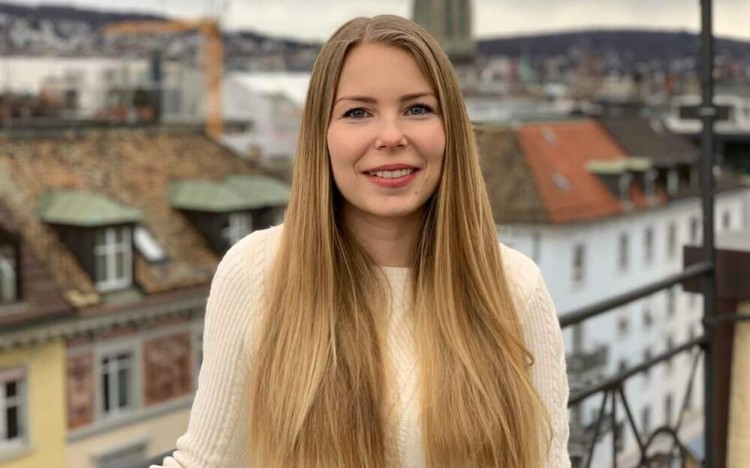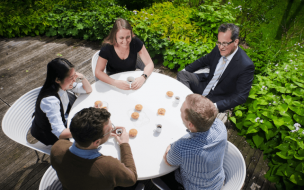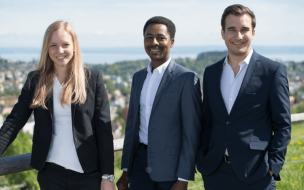In terms of her decision-making process, Kirsimarja is not alone. According to the Graduate Management Admission Council, 81% of prospective graduate students globally say they consult rankings when researching business schools.
Since St. Gallen entered the FT’s Masters in Management ranking in fourth position in 2010, the SIM program has been ranked the best in the world for eight consecutive years. The FT places a strong emphasis on financial data, so SIM students tend to expect to earn high salaries and bonuses after graduation.
Yet, for Kirsimarja, who had already studied a bachelor’s in management in Germany, the overall experience offered by the SIM was a more decisive factor.
More than the ranking, Kirsimarja was attracted by the SIMagination Challenge, a core pillar of the program during which students plan, fundraise for, and execute social impact projects across the world. Kirsimarja’s team worked to install clean cooking facilities in family homes in Guatemala.
Through the SIM, Kirsimarja also got the chance to intern at venture capital firm Cavalry Ventures in Berlin and at Google in Dublin.
“I felt as if SIM was tailored to my needs and interests,” Kirsimarja explains. “The program encourages practical experience and, besides the core courses, you are free to set the direction of your degree.”
Kirsimarja Säkkinen, SIM ‘18
SIM highlight: "The SIMagination challenge. In Guatemala, we installed clean cooking stoves for families who mostly cooked inside with open fires and had smoke in their living quarters, resulting in many health issues. The new stoves had chimneys and required less wood to burn but were way too expensive for these families to afford. It was rewarding to see how impactful our project was."
Favorite professor: "Tomi Laamanen, our strategic management professor and the academic director of SIM. Strategy is one of the topics I am most interested in and Tomi is extremely well researched and published in the area. Besides that, he is all smiles and excitement in class and very approachable also outside of it. He has a huge repertoire of personal experience and he translates it into practice-oriented classes, where we maximize learning by doing."
Community of friends
For Kirsimarja, the reason for the Master in Strategy & International Management’s success is simple: its people. Her 55 classmates came from 24 different countries.
Students go through workshops which dig into their personalities and encourage self-reflection. On Career Power Days, they get personalized feedback on their strengths, weaknesses, and behavior in a team, while a dedicated career counselor is on hand to support them throughout the program.
Outside class, ‘SIMmies’, as SIM students refer to themselves, run themed evenings every month, organize an annual class trip abroad together, and host SIM Career Tea Time Events, where they hear from St. Gallen alumni about their experiences working in a variety of industries.
“I knew that through studying at St. Gallen I would have great opportunities to get in touch with interesting employers, but one of the things I value the most are the close friends I’ve gotten through this community,” Kirsimarja continues.
“I heard a saying that ‘a SIMmie never lets another SIMmie fail’, and I could not agree more with that. We’ll continue to have this web of incredible individuals around us after the program, learn from each other, and help each other reach our goals.”
For Kirsimarja, those goals include working for a company which combines her interests in strategy, technology, and sustainability.
Daniel Topolanek, SIM/MBA ‘19
SIM highlight: "There were honestly a lot, but the best thing was going to Mallorca with the majority of the class at the end of first year to celebrate completing our first year but also reminiscing the great times we had."
Favorite professor: "Heike Bruch, who is a thought leader on the topic of leadership and teaches in a very energetic way. She truly cares about the students learning experience and takes time to make sure all students benefit."
For fellow SIMmie, Daniel Topolanek, the short-term path is both clear and unconventional. He’s currently pursuing an MBA program in Costa Rica, as part of his dual degree.
He plans to travel to Honduras to complete his Divemaster scuba diving qualification and Colombia to improve his Spanish. At some point, he’ll find time to complete his master thesis. Then, he’ll consider his career options, across social impact consulting, impact investing, or the sustainability space.
For Daniel and Kirsimarja, the SIM is not just about getting a top job, but about building life experience as well.
What makes a top-ranked master’s degree?
For Daniel too, it’s about the profile of the people there. “I remember stalking people on LinkedIn and was like ‘Holy cow, those people are really impressive!’” he says.
“The SIM also cares about so much more than business. It cares about sustainability, social impact and about helping high-potential people to follow their dreams, whether it’s in consulting or founding a social enterprise.”
Business with impact
It was the idea of doing business with impact which formed the origins of the program. Whereas the 50 or so students in the SIM class today are 90% international with almost a 50-50 gender split, when the program launched in 2004 most of the 21 students were German-speaking and there was only one female student.
Omid Aschari, managing director and creator of the SIM program, describes the decision to enter the Financial Times rankings in 2009 as a “gamble.” Being well-ranked has never been the focus, but it has allowed him to make aspects of the program more visible.
Today, Omid—who came from leadership development in the corporate world to St. Gallen—and the St. Gallen admissions team look for students who are looking to progress, not just in their careers, but as human beings.
“When we look at essays or video interviews, the first thing we try to find out is: Does a candidate have a growth mindset? Do they want to understand their strengths and weaknesses and challenge their assumptions? Do they focus on serving others, rather than saying ‘What’s in it for me?’”
Accredited by AACSB and EQUIS, most students on the SIM are around 24 years old with some work experience under their belt. SIM grads tend to pursue careers in consulting or financial services after graduation, although Omid says more and more are working for startups in Silicon Valley, London, and Berlin.
The Master in Strategy & International Management itself is in constant development, with the interests of each generation of students taken in mind. Right now, Omid and the leadership team are building up the SIM’s focus on digitization and exploring links with companies like Facebook, Google, and Uber. By 2020, Omid expects to establish a coding camp, bringing coding whiz kids on-campus to train up SIM students.
This year, the Financial Times is conducting the first major review of its rankings methodologies since they were established over two decades ago. The FT plans to address the heavy weight it gives to financial data and focus more on a school’s commitment to wider society.
These changes may trigger the first real mix up to the rankings in some time, yet the forward-looking nature of St. Gallen’s SIM program should stand it in good stead.











